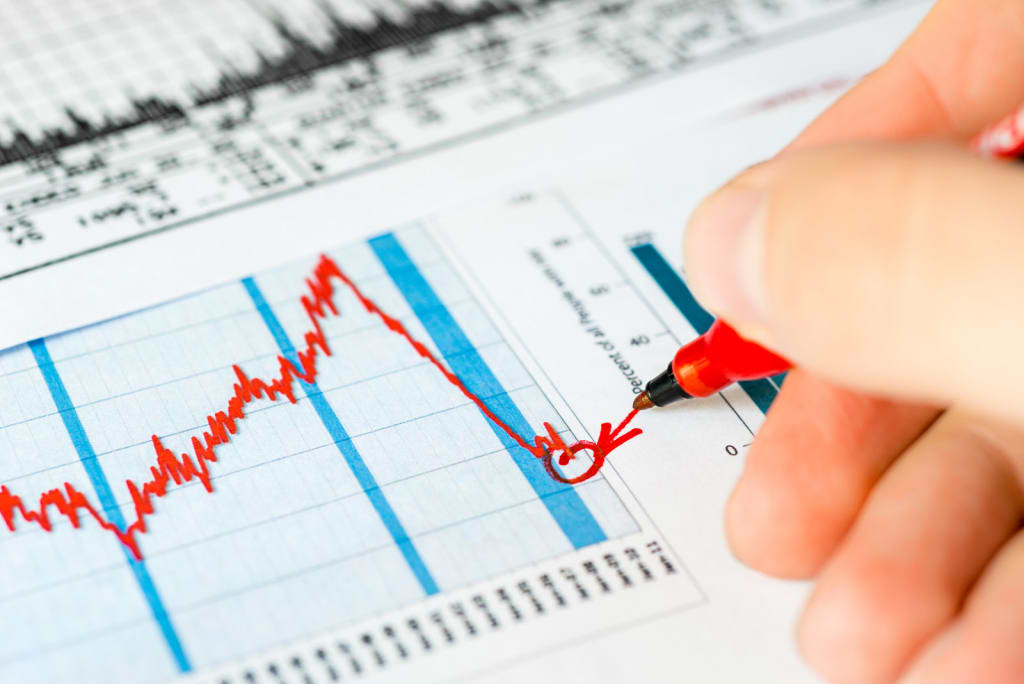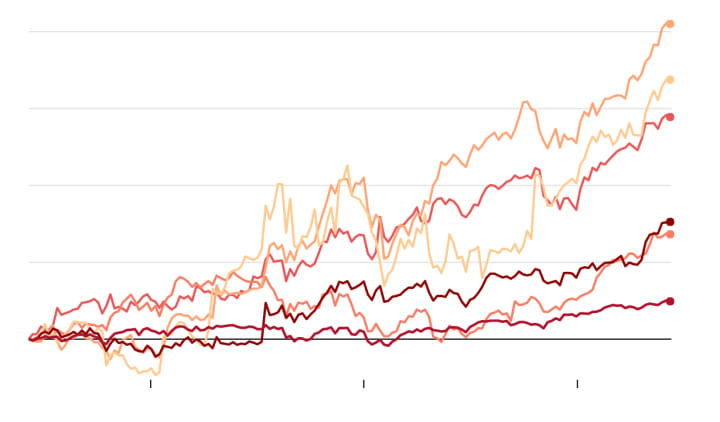Signs of Trouble in the Stock Market
Trouble in the stock market has been proven to be predictable. Here's when you should batten down the hatches, according to the pros.

The stock market is one of the biggest indicators of economic health, and also remains one of the greatest ways to make your money work for you. Investing money regularly in your portfolio is a wise choice, but if you really want to make an investment, you'll work to capitalize on the stock market's fluctuations—and invest way more when the market is down.
Those who make a living trading stocks often make a point of predicting when stock markets will crash or tumble based on a number of factors. There are even entire studies that are dedicated to finding out what could trigger recessions, crashes, and depressions.
Ever wonder how experts figure out whether there will be upcoming trouble in the stock market? So far, these indicators have proven reliable indicators that markets won't stay bullish too much longer.
Junk bonds start faltering.
Junk bonds are bonds that are issued out during good stock market times tend to retain value, primarily because of the fact that riskier investments are still stable enough to avoid folding.
Bond markets and stocks tend to move in tandem. If high-risk bonds, which still tend to be safer than stocks, start to falter, stocks will start to wobble too. As a result, the overall behavior of junk bonds tends to be one of the signs of trouble in the stock market.
The growth of companies starts to peak.
There's only so fast a speed that companies can grow at, and there's only so many people you can hire for a single corporation. Even professionally-measured statistics are showing that the performance of the market might be nearing its peak levels.
One indicator, the ISM Manufacturing index, typically reaches close to 60 when there's trouble in the stock market around the corner. Right now, its levels are in the high-50s, suggesting that we might not actually be able to sustain the company performance we're seeing for too much longer.
Most of the biggest stock crashes in history were seen following streaks of unusually high performance. That being said, a lot of the greatest trades in investing history also were done around these times—primarily by people who noticed that the valuation didn't match the output.
More investors are starting to becoming prone to risk-taking.

One of the leading signs of trouble in the stock market is over-valuation, similar to what happened during the Dot Com boom. Does everything seem like it's getting over-valued, and getting hyped that it'll be the "next thing to explode?"
The way most stock investors get their determination of whether something's overvalued is seeing the Price-to-Earnings ratio, also called PE ratio for short. Historically, the average PE ratio has been around 15.66. This is the price of the stock, to the amount that you will get in terms of earnings.
Right now, the typical PE ratio is around 24. This means that the market is becoming somewhat overvalued. The funny thing is that markets can stay overvalued for a very long time before they require a correction. However, they always will eventually correct themselves.
On a similar note, a lot of ultra-high priced stock tends to be a warning that things might crunch down later.
You're noticing bubbles happen.
Bubbles are one of the lead causes of trouble in the stock market. This is what happens when a certain industry starts growing too quickly and ends up increasing volatility and over-valuation rapidly. A good example of this would be the Dot Com boom, or the internet-based business boom of the late 90s.
With bubbles, markets become irrational about the pricing of what they're offering. Common signs that a bubble is happening include seeing a flood of investors run towards a particular industry, extreme optimism about a stock, as well as the inability to sustain purchases at the price an item is being sold.
Birth rates start to slump.
Believe it or not, one of the newest ways people are watching for trouble in the stock market is by looking at birth rates. Studies have shown that the birthrates through the United States start to slow down as the economy heads towards a dip.
It's not fully certain why this is, but many economists believe that the lagging birthrates may have something to do with the overall sentiment of the economy's safety. Either way, slowed birth rates have happened prior to every single major depression and recession.
Deregulation of industry also tends to cause trouble in the stock market.
You'd think that deregulation of industry would give better profits, and that's true up to a point. Historically, though, industries that face heavy deregulation tend to be more prone to crashes later on. This is often because the companies in question take heavier risks, knowing they will not be in trouble if they do.
The deregulation that caused the sub-prime mortgage lending in the 2000s was what sparked the Great Recession. Similar deregulation legislation has started to pass into law, which means that we may be looking at some ugliness up ahead.
It's getting euphoric in here.

When you're dealing with over-valuation, heavy risk taking, and bubbles beginning to grow, investors start to ignore a lot of strange behavior on the stock market. For example, they may ignore the S&P 500 climbing, despite the fact that Federal statistics are really remaining stagnant.
Trouble in the stock market starts when the trades people make aren't making sense. They may even notice that the yield isn't matching the value, and explain it away. Traders call this "euphoria" and it's a destructive form of hyper-optimism.
Euphoria can lead a lot of traders to speculate in stocks that shouldn't be touched with a ten-foot pole. Crashes and recession happen when people start saying "everything's different this time." If you notice that attitude taking hold, that's a bad sign.
Stocks are starting to become more volatile.
Unsurprisingly, one of the key indicators that you're going to see more trouble in the stock market is a spike in volatility. Rapid gains and losses suggest that people are getting over-exuberant about trading, or that people are beginning to panic.
In some cases, this could be a sign of a "melt up," also known as a rapid acceleration in the price of a product. When markets melt up, they often will have a sudden crash sooner rather than later.
The average consumer isn't doing well.
Whether Wall Street wants to admit it or not, it's the average consumer who ends up determining the stock market's health. When the average Joe can't afford to buy goods, stocks and businesses suffer huge losses. After all, the majority of people aren't the 1 percent; they're the average consumer.
Mainstream consumers being unable to afford goods will make it hard for companies to meet quotas, and could cause major losses for larger corporations. Right now, a growing number of consumers can no longer participate in the economy—and that could lead the numbers people are using to buy stocks to get skewed.
If the average person is seeing serious financial trouble, you can expect that to translate into the stock markets as well. Trouble on Main Street can and will spell trouble in stock markets.
Lastly, having a Republican president tends to signal future trouble in the stock market.
Much like a lagging birthrate, this is one of those not-totally-related indicators that has proven to be reliable when it comes to figuring out future stock market woes. Bear markets and Republican policy go hand in hand.
Studies have shown that having a Republican president that favors tax cuts to corporation tends to cause a recession or a crash to occur shortly afterward. All things considered, the red flags we've mentioned should make you wonder what's ahead for us in the future.
About the Creator
Rowan Marley
Rowan Marley is a 20-year-old sports enthusiast who hails from Brooklyn. When he's not hitting up a local Zumba class, he's drinking organic smoothies. That's just how he rolls.






Comments
There are no comments for this story
Be the first to respond and start the conversation.